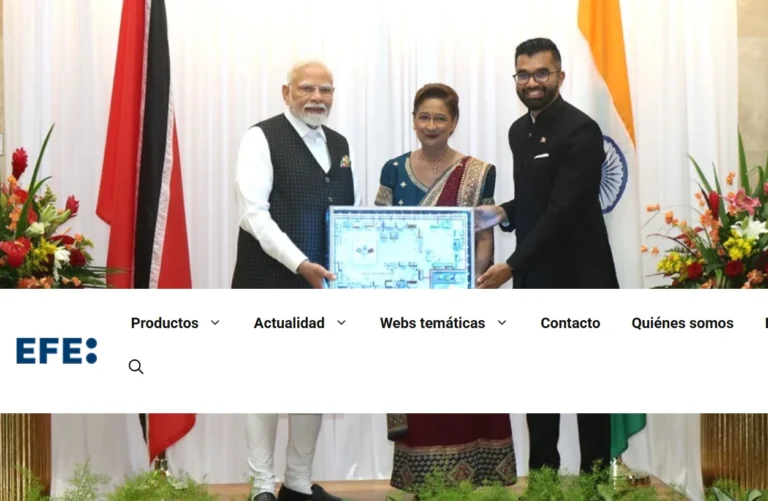Modi Urges Greater Role for Global South During State Visit to Trinidad and Tobago
During a two-day official visit, Indian Prime Minister Narendra Modi addressed Trinidad and Tobago’s Parliament, calling for stronger representation of the Global South in international governance and reaffirming the historic and economic ties between the two countries.

Indian Prime Minister Narendra Modi receives the Order of the Republic of Trinidad and Tobago—the country’s highest award and the first ever granted to a foreign leader. Photo: EFE
July 5, 2025 Hour: 6:53 am
Indian Prime Minister Narendra Modi concluded a two-day state visit to Trinidad and Tobago on Friday, urging international cooperation to elevate the Global South’s role in global governance. The trip is part of India’s broader outreach to Caribbean and developing nations as it positions itself as a leading voice of the Global South.
RELATED:
Social Activists Demand Global Economic Justice at the Seville Conference
Addressing Trinidad and Tobago’s Parliament, Modi emphasized the need to address long-standing inequalities in the global order. “It is time we work together to give the Global South its rightful place at the table,” he said, calling for a more inclusive and representative international system.
He recalled that the 75th anniversary of the United Nations raised hopes among developing countries that their voices would finally be heard. “But that hope has turned into disappointment. The voice of the developing world remains on the margins,” Modi stated. He underscored India’s commitment to shared progress: “Whenever we have had the opportunity, we have spoken up for the Global South.”
Modi described Trinidad and Tobago as “an important partner in this effort” and announced that the country would be a priority for bilateral cooperation. India, he said, will share expertise and provide technology and equipment in sectors such as agriculture, horticulture, and food processing to support Trinidad and Tobago’s agro-industry.
During his visit, Modi met with President Christine Kangaloo and former Prime Minister Kamla Persad-Bissessar, current leader of the opposition United National Congress (UNC).
Modi became the first foreign leader to receive the Order of the Republic of Trinidad and Tobago (ORTT), the country’s highest national award. “This honour symbolizes the deep and lasting friendship between our two countries. I accept this award on behalf of the people of India, as it is a collective source of pride for our 1.4 billion citizens,” he said at the award ceremony.
The distinction also reflected the historical connection between the two nations. Approximately 35% of Trinidad and Tobago’s population is of Indian descent, with roots tracing back to the 19th and early 20th centuries, when indentured labourers were brought to work on sugar plantations after the abolition of slavery. “It is a great source of pride that the Indian community here continues to preserve our shared traditions, culture, and customs with such care and devotion,” Modi added.
The award sparked criticism from the Anjuman Sunnat-ul-Jamaat Association (ASJA), a leading Muslim organization in Trinidad and Tobago. The group condemned the decision, citing Modi’s domestic policies in India, particularly the 2019 Citizenship Amendment Act—a law that fast-tracks citizenship for non-Muslim refugees from neighboring countries. Critics argue the law discriminates against Muslims and undermines India’s secular constitution. ASJA also accused Modi of promoting rhetoric that fuels Islamophobia.
Modi’s visit to Trinidad and Tobago highlighted India’s growing diplomatic engagement with the Global South, combining cultural diplomacy with economic and political outreach. While the trip reinforced historical bonds and regional cooperation, it also drew attention to the contrast between India’s global aspirations and the internal controversies surrounding its leadership—an evolving dynamic that many in the South are watching closely.
Author: MK
Source: EFE






